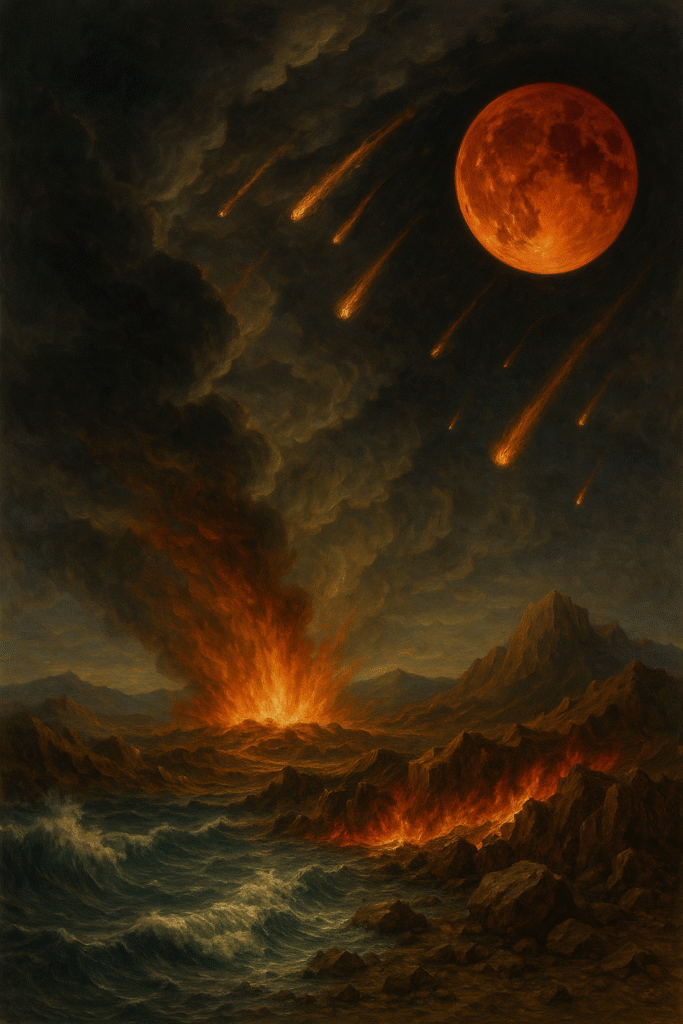
Do we not often suppose that the “great and notable day of the Lord,” spoken of by the prophet Joel and quoted by Peter [Acts 2], was already fulfilled at the destruction of Jerusalem? Joel said, “I will show wonders in the heavens above and signs on the earth beneath: blood, fire, and vapor of smoke. The sun shall be turned to darkness, and the moon to blood, before that great and notable day of the Lord comes.” But even if we admit that these words were not fulfilled then, are we not quick to say they must apply only to the very end of the world?
Because the world today is caught up in worldly pursuits, does that prove the great day of the Lord is far off? Because people seem blind, and nations slumbering concerning that great day, does this assure us that the Lord delays His coming? Or does it not rather serve as a warning sign that the time draws near—when the Son of God will descend from heaven with His mighty angels, in flaming fire? Do the scriptures ever say that the whole world will be prepared to meet Him when He comes the second time, “without sin unto salvation”? Do they say all will be watching eagerly for His arrival, like watchmen expecting a thief in the night—when the heavens will pass away with a great roar and the elements will melt with fervent heat? Or do the apostles teach that these events will truly and literally take place, just as written?
If that is the case, then we ask: has the prophecy in Matthew 24 been fulfilled? He recorded the Lord’s words: “Immediately after the tribulation of those days the sun will be darkened, the moon will not give its light, the stars will fall from heaven, and the powers of the heavens will be shaken. Then will appear the sign of the Son of Man in heaven. Then all the tribes of the earth will mourn, and they will see the Son of Man coming on the clouds of heaven with power and great glory.” This remarkable teaching, given directly to the apostles by Jesus, was not only written by Matthew. There was a real expectation—indeed a promise—of glory that would burst forth upon the saints: a day of redemption, when they themselves would sit on thrones and judge the twelve tribes of Israel.
Luke makes the subject even clearer. After recording the Lord’s prophecy about Jerusalem’s destruction and the scattering of the Jews into all nations—that Jerusalem would be trampled by the Gentiles until their times were fulfilled—he added: “There will be signs in the sun, the moon, and the stars; and on the earth, distress among nations with confusion; the sea and the waves roaring; men’s hearts failing them for fear of what is coming upon the earth, for the powers of heaven will be shaken. Then they will see the Son of Man coming in a cloud with power and great glory.” [Luke 21:25–27.] Can this language be misunderstood? Can anyone reasonably believe it has already been fulfilled? Were the apostles mistaken? Or did not Christ himself plainly say these things would come to pass?
Isaiah also declared: “In the day of the fierce anger of the Lord of Hosts, the heavens shall tremble, the earth will be moved out of her place, the sun will be darkened in its going forth, and the moon will not give its light.” [Isaiah 13.] John, on the isle of Patmos, described the opening of the sixth seal [Revelation 6]: “There was a great earthquake; the sun became black as sackcloth of hair, the moon became as blood, and the stars of heaven fell to the earth as a fig tree casts its unripe figs when shaken by a mighty wind. The sky vanished like a scroll being rolled up, and every mountain and island was moved out of its place.” If these prophecies have not yet been fulfilled, they must concern either this or a future generation. And who can seriously claim that they already have? Events of such magnitude could not have occurred without being recorded in history, filling us now with wonder and amazement.
That they will yet take place is certain, for the truthfulness of the scriptures pledges their fulfillment. Whether this glorious day will come before we die, we cannot say—we do not know. Whether in this generation or a future one, we will not predict. But the signs of the times are enough to warn every person that the day is close at hand. And the solemn warning of the Lord himself applies to us all [Matthew 24:44]: “Therefore you also must be ready, for in an hour you do not expect, the Son of Man comes.” Joseph Smith, Evening and Morning Star, December 1833 Nauvoo, IL
